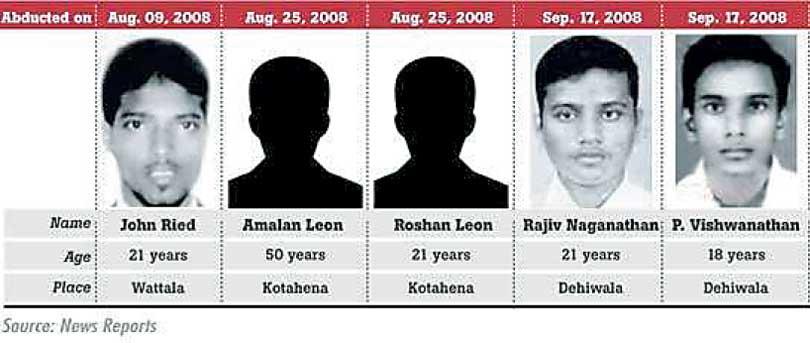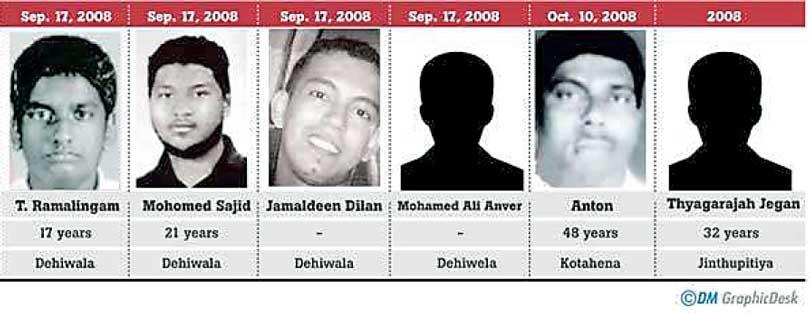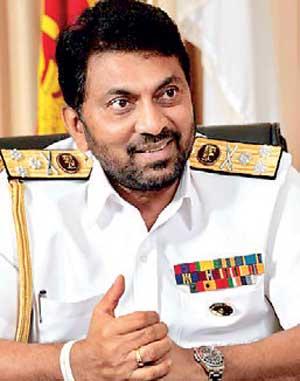Reply To:
Name - Reply Comment


 Sri Lanka’s effort to find a closure to the victims of the protracted terrorist war is obstructed by two ideological extremes, each feeding into the agenda of the other. On one extreme end of the scale, Sinhala ultra-nationalists and electoral calculations of Southern politics have opposed almost all on-going and past initiatives to prosecute military officials implicated in even the most blatant human rights violations. Similarly, self-serving machinations are pushing back against a Cabinet memorandum to appoint a Truth and Reconciliation Commission, the release of military occupied land to their owners and to a new constitution .
Sri Lanka’s effort to find a closure to the victims of the protracted terrorist war is obstructed by two ideological extremes, each feeding into the agenda of the other. On one extreme end of the scale, Sinhala ultra-nationalists and electoral calculations of Southern politics have opposed almost all on-going and past initiatives to prosecute military officials implicated in even the most blatant human rights violations. Similarly, self-serving machinations are pushing back against a Cabinet memorandum to appoint a Truth and Reconciliation Commission, the release of military occupied land to their owners and to a new constitution .
On the other extreme, the LTTE rump, their affiliated groups and paid coolies are hell-bent on discrediting the Sri Lankan state for defeating an egregious terrorist group that they bankrolled for nearly two decades. The annihilation of the LTTE was a fait acompli and is beyond the reversal within the available means of the Tamil separatist campaign. (Unless of course, yet another government in Colombo hides its head in the sand to be rudely woken up by another bus bomb as it happened for three times in the short independent history both in the South and the North). The demand for an international investigation is therefore the consolation prize for losing the Eelam war.
If Sri Lanka is to move forward, the government should address reasonable grievances of war victims, and prosecute the perpetrators of at least some of the well documented violations of human rights. It should do so on its own accord, dictated by its own calculations of national interest- and not necessarily because its European friends want it to do so. Or because the government wants to appease the Tiger loving Tamil diaspora and their local partners.
Indeed, the wheels of justice are moving slowly but steadily. Former Commander of Navy Admiral Wasantha Karannagoda and other officers who were accused of the abduction and disappearance of 11 youths are expected to face a trial-at-bar, according to the Attorney General’s Department. The CID had accused Adm. Karannagoda of abetting the illegal confinement of the 11 young men by a Navy Unit led by his personal security officer Lt. Commander Sampath Munasinghe, as well as concealing information despite having the prior knowledge of illegal detention of at least five youths. The CID had observed that those lives could have been saved had the former Navy Chief acted in a timely manner.
Earlier, the Colombo Chief Magistrate impounded the passport of Adm. Karannagoda. Police are said to be in search of him. Earlier he filed a fundamental rights petition seeking a court order preventing his arrest. The Attorney General’s department refused to give an undertaking that the former Navy chief would not be arrested by the CID. The court will hear the petition this Friday.
The CID has accused the Navy Unit of operating a lucrative abduction racket which abducted children of wealthy Tamil families and extracted hefty extortion.
However, three former commanders of Sri Lankan security forces, Air Chief Marshal Roshan Goonetileke, General Daya Ratnayake, and Admiral Thisara Samarasinghe came to the defence of the former Navy Commander. They criticized the on-going legal proceedings, as they implied, because these violations were committed while the ‘war was going on’, and also because, Adm. Karannagoda was the naval strategist who defeated the sea Tigers.
 None of that sounds convincing in a legal or commonsense. Nor did ex-service commanders explain as to how the abductions of children for ransom could have helped defeating the LTTE. The war winning former regime extended a virtual carte blanch to the security forces during its fight against the LTTE, and did not investigate when there were lapses, oversight and deliberate abuses of that authority. Sri Lanka’s reconciliation efforts are now hounded by the ghosts of that arbitrary past.
None of that sounds convincing in a legal or commonsense. Nor did ex-service commanders explain as to how the abductions of children for ransom could have helped defeating the LTTE. The war winning former regime extended a virtual carte blanch to the security forces during its fight against the LTTE, and did not investigate when there were lapses, oversight and deliberate abuses of that authority. Sri Lanka’s reconciliation efforts are now hounded by the ghosts of that arbitrary past.
Then, divisive politics in Sri Lanka have a history of obstructing any meaningful initiative for reconciliation. The UPFA has described the legal proceedings against Adm. Karannagoda as part of the government’s election “campaign” to attract Tamil votes ahead of the election and to ‘please the international community and the Tamil diaspora’.
Also there are plenty of self- serving opportunists, bigots, and jobless loonies who cry foul at the on-going reconciliation efforts. Interestingly though these groups are opposing very domestic initiatives aimed at healing the old wounds. These local initiatives, in fact, subdue the calls for an international probe, and also discourage the prospect of universal jurisdiction being resorted to over the allegations of the Eelam war.
By obstructing domestic initiatives, these groups are helping their ideological nemesis of the fringe Tamil diaspora. These groups, such as Rudrakumar’s Transnational government of Tamil Eelam and the LTTE rump at home and abroad, are not necessarily driven by the interest of the Sri Lankan Tamils. Nor would they be satiated by even the most transparent domestic initiatives. These groups were (and are) accessories and partners of a terrorist group and should be treated as such. It is naïve to expect a change in their behaviour through positive engagement. The global hunt for the LTTE rump does not have to end with KP. The failure of successive governments to adequately express its displeasure over the regular display of LTTE flags in Western capitals is proof of the indifference of the state.
Finally there is an element of foreign policy. Sri Lanka is expected to co-sponsor yet another UNHRC resolution with the Britain-led core group. This is a complete u turn, and indeed the more sensible one, from an earlier plan to withdraw the support from the previous UNHRC resolution which Sri Lanka cosponsored with the EU.
However, the current UNP-led government’s dependence on the Europe and America on anything and everything, despite the latter under Donald Trump had already abandoned its lesser important allies, does no good to the country. Trade off of these choices driven by whimsical personal and ideological preferences are high especially when they come at the growing detachment from Sri Lanka’s time-tested allies such as China.
As much as Sri Lanka’s over dependence on Beijing is not conducive, so are any foreign policy choices that comes at its expense, not least because the Chinese have deep pockets. But also because, it insulates Sri Lanka from a good deal of adverse international pressure and provides it with freedom of action.
Sri Lanka should devise an independent course of action to address the grievances of the Tamil national problem and repercussions of the separatist terrorism. Doing so, it should not be dictated by the agenda of the nationalist bigotry in the South or the LTTE rump the West and residue at home.
Follow @RangaJayasuriya on Twitter